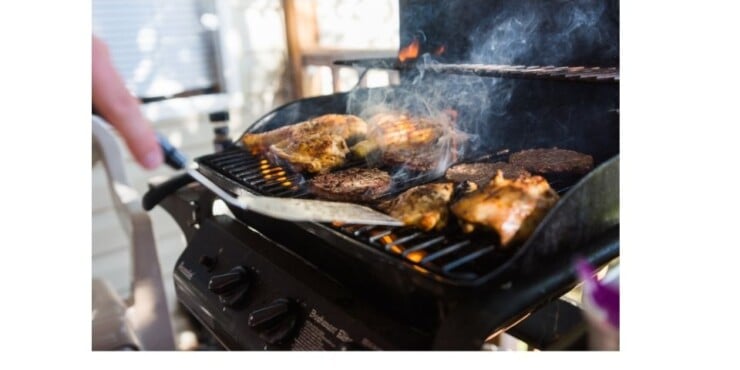Can you use a propane grill indoors? It’s really common for people to be confused about whether or not they can use a propane grill indoors. This article will help clear up your confusion and let you make an informed decision that you’ll never regret.
What is a Propane Grill?
A propane grill, or LP grill, is a type of gas grill that uses propane for cooking. The best propane grills are relatively inexpensive and offer a convenient, mess-free way to cook your favorite foods.
A propane gas grill is an excellent option for those looking to cook on a grill without the hassle of charcoal.
Propane grills are convenient, mess-free unlike charcoal grills, they offer precise heat control and are relatively inexpensive to use.
They are also easy to clean since you don’t have to deal with ash or the other messy byproducts of charcoal grilling.
Can You use a Propane Grill Indoors?
Do not use a propane grill indoors. These grills are designed to operate in an open space with proper ventilation.
Propane grills have safety features that will shut off the gas flow if the unit is overheating or if its sensors detect that there isn’t enough oxygen.
However, this doesn’t mean that propane grills are safe to use indoors. It’s always best to be cautious when using any type of grill.
If you already own a propane grill and decide you want to cook indoors with it, check the manual if there is any instructions on how to properly convert the grill for indoor use
Why Can’t You Use a Grill Indoors?
The answer is simple, it’s because of carbon monoxide poisoning. Carbon monoxide is the dangerous byproduct of combustion processes (like grilling). It is odorless, colorless, and silent but can be deadly. Since your body doesn’t have a way to detect it, you need to actively avoid it.
If you are exposed to carbon monoxide, you’ll get a headache and experience nausea and fatigue. If you continue to be exposed to carbon monoxide, the effects will have a serious negative impact on your wellbeing.
How Does a Propane Grill Work?
A propane grill is fueled by a tank of liquid propane gas that’s connected to the grill by a flexible tube. The gas is fed into the grill via burners, which contain holes through which the gas flows before its ignited. These burners are generally arranged in rows running front-to-back across the grill’s cooking surface.
Once a burner has been lit, it will produce an even flame that can be adjusted using knobs on the front control panel of the grill. These knobs allow you to control how much fuel you feed into each burner, and thus how hot they get — hotter burners will cook food faster, but they may also char your meat if you aren’t careful.
Do Propane Grills Give off Carbon Monoxide?
Propane grills, like charcoal grills and gas grills, also give off carbon monoxide gas as a by-product of combustion. However, the amount of carbon monoxide emitted by the propane grill is so small that it’s considered to be nontoxic.
That’s not to say that you can safely use your propane grill in an enclosed space. Using any kind of grill inside is a bad idea because it can increase the risk of both fire and carbon monoxide poisoning.
Carbon monoxide is an odorless, colorless gas that is produced when most fuels are burned. If you start to experience symptoms of carbon monoxide poisoning while grilling, leave the area immediately and seek fresh air.
Are there Propane Grills that work Indoors?
YES! There are indoor grills that run on electricity, but they’re not cheap. Expect to spend at least 80 – $300. That may sound like a lot, but it’s less than the price of a gas grill, and if you live in an apartment where charcoal or gas grilling isn’t allowed, it may be worth it.
Conclusion on Using Propane Grills Indoor
Using a propane grill indoors can be dangerous. Even if you are using your grill as a stovetop, it is still possible to fill the surrounding area with harmful carbon monoxide. Though this gas is odorless and colorless, it can cause serious health problems, such as headaches and dizziness. In extreme cases, carbon monoxide poisoning can even lead to death. In order to avoid these problems, it’s important that you never use your propane grill inside your house.

